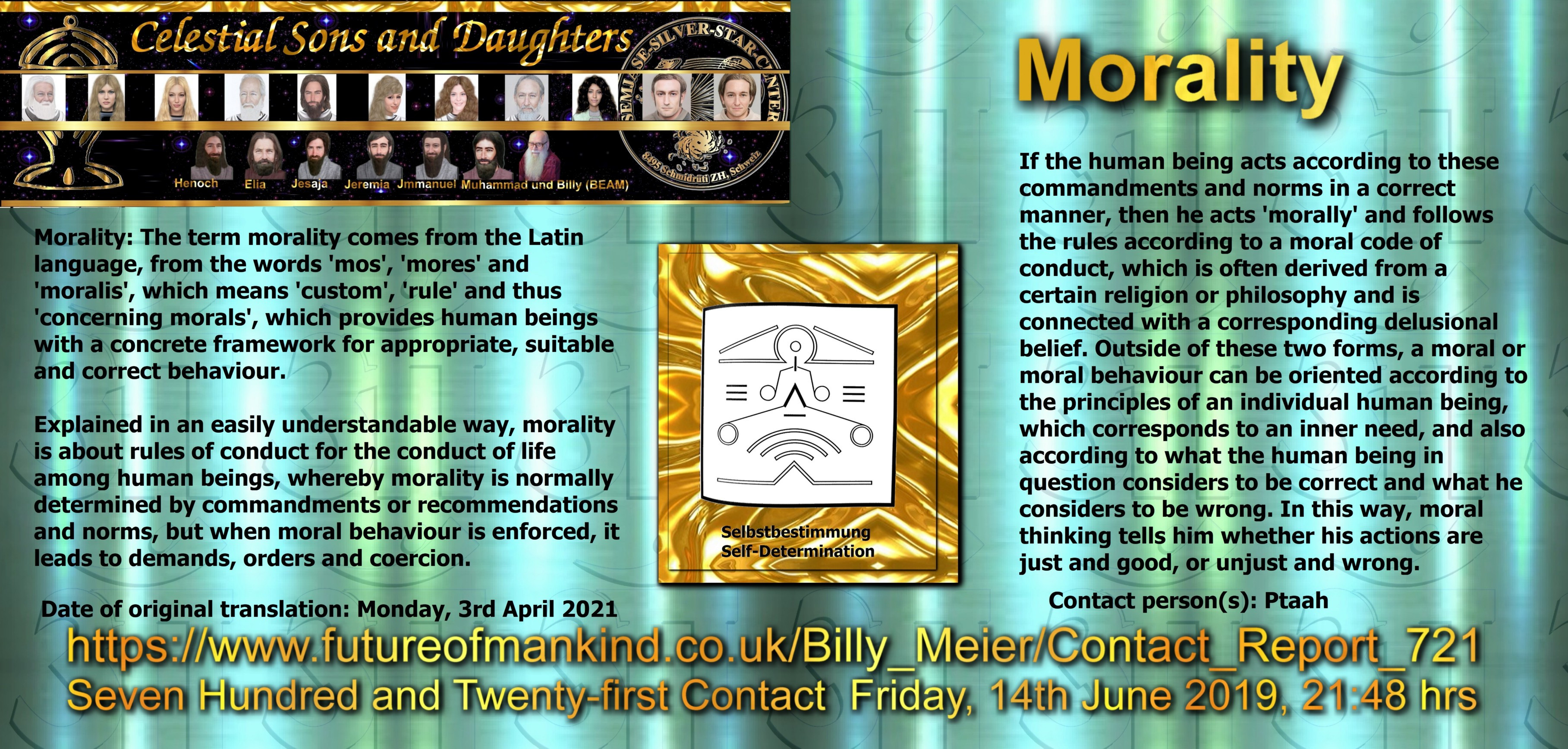Contact Report 721
Contact Reports Volume / Issue: 17 (Plejadisch-Plejarische Kontaktberichte Block 17)
Morality
Morality: The term morality comes from the Latin language, from the words 'mos', 'mores' and 'moralis', which means 'custom', 'rule' and thus 'concerning morals', which provides human beings with a concrete framework for appropriate, suitable and correct behaviour.
Explained in an easily understandable way, morality is about rules of conduct for the conduct of life among human beings, whereby morality is normally determined by commandments or recommendations and norms, but when moral behaviour is enforced, it leads to demands, orders and coercion. If the human being acts according to these commandments and norms in a correct manner, then he acts 'morally' and follows the rules according to a moral code of conduct, which is often derived from a certain religion or philosophy and is connected with a corresponding delusional belief. Outside of these two forms, a moral or moral behaviour can be oriented according to the principles of an individual human being, which corresponds to an inner need, and also according to what the human being in question considers to be correct and what he considers to be wrong. In this way, moral thinking tells him whether his actions are just and good, or unjust and wrong.
Moral
Moral: Der Begriff Moral entstammt der lateinischen Sprache, und zwar aus dem Wort ‹mos›, ‹mores› und ‹moralis›, das soviel wie ‹Sitte›, ‹Vorschrift› und also ‹die Sitten betreffend› bedeutet, was dem Menschen einen konkreten Handlungsrahmen für ein angebrachtes, angemessenes und korrektes Verhalten vorgibt.
In leichtverständlicher Weise erklärt, handelt es sich bei der Moral um Verhaltensregeln zur Lebensführung unter den Menschen, wobei Moral im Normalfall von Geboten resp. Empfehlungen und Normen bestimmend wird, jedoch dann, wenn das Moralverhalten erzwungen wird, bis hin zu Forderungen, Befehlen und Zwang führt. Handelt der Mensch nach diesen Geboten und Normen in richtiger Weise, dann handelt er ‹moralisch› und befolgt die Regeln gemäss einem moralischen Verhaltenskodex, der oft von einer bestimmten Religion oder Philosophie abgeleitet wird und mit einem entsprechenden Wahnglauben verbunden ist. Ausserhalb dieser beiden Formen kann eine Moral resp. ein Moralverhalten nach den Prinzipien einer individuellen Person ausgerichtet sein, die einem inneren Bedürfnis entspricht, und zwar auch demgemäss, was der betreffende Mensch als richtig und was er als falsch erachtet. In dieser Weise sagt ihm das Moraldenken, ob seine Handlungen gerecht und gut, oder ungerecht und falsch sind.
Seven Hundred and Twenty-first Contact Friday, 14th June 2019, 21:48 hrs
Contact Reports Volume / Issue: 17 (Plejadisch-Plejarische Kontaktberichte Block 17)
Pages: 394–463 [Contact No. 710 to 722 from 11.09.2018 to 08.08.2019] Stats | Source
Date and time of contact: Friday, 14th June 2019, 21:48 hrs
Translator(s): DeepL Translator, Stefan Zutt, Bruce Lulla, Mariann Uehlinger
Date of original translation: Monday, 3rd April 2021
Corrections and improvements made: Joseph Darmanin
Contact person(s): Ptaah
https://www.futureofmankind.co.....uk/Billy_Meier/Cont
The Heralds of the sevenfold Nokodemion- Herald-line
Herald of the CREATION-ENERGY TEACHING - SCHÖPFUNGSENERGIELEHRE
Billy BEAM was all true Heralds from Nokodemion Line
The 7 Heralds: Henoch (Enoch) → Elia (Elijah) → Jesaja (Isaiah) → Jeremia (Jeremiah) → Jmmanuel (Immanuel) → Muhammad (Mohammed) → Billy (BEAM)
https://www.creationaltruth.or....g/Portals/0/Document
http://billybooks.org/
WWW.FIGU.ORG
http://theyfly.com/new-translation-talmud-jmmanuel
http://www.figu.org/ch/files/d....ownloads/buecher/fig
http://www.futureofmankind.co.....uk/Billy_Meier/The_P
https://ca.figu.org/what-s-new2.html
"Billy' Eduard Albert Meier/BEAM" Last Herald - Line of Nokodemion








